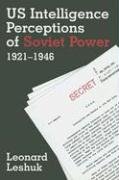Leshuk, Leonard (3 results)
Product Type
- All Product Types
- Books (3)
- Magazines & Periodicals
- Comics
- Sheet Music
- Art, Prints & Posters
- Photographs
- Maps
-
Manuscripts &
Paper Collectibles
Condition
- All Conditions
- New
- Used
Binding
- All Bindings
- Hardcover
- Softcover
Collectible Attributes
- First Edition (2)
- Signed
- Dust Jacket (2)
- Seller-Supplied Images
- Not Printed On Demand
Seller Location
Seller Rating
-
US Intelligence Perceptions of Soviet Power, 1921-1946
Published by Frank Cass, London, 2003
ISBN 10: 0714653063ISBN 13: 9780714653068
Book
Hardcover. Condition: Near Fine. Dust Jacket Condition: Near Fine. A nice, bright copy. ; Military History And Policy; 6.5 X 1 X 9.25 inches; 284 pages.
-
US Intelligence Perceptions of Soviet Power, 1921-1946 (Military History & Policy)
Published by Routledge, 2013
ISBN 10: 0714653063ISBN 13: 9780714653068
Seller: Paul Hanson T/A Brecon Books, Brecon, POWYS, United Kingdom
Book First Edition
Cloth. Condition: Very Good. Dust Jacket Condition: Very Good. First Ed. Ships from the u.k .light creasing tail of spine of dw, book likewise slight wear.A fine copy, contents are as new.Very scarce . Size: 8 Vo.
-
US Intelligence Perceptions of Soviet Power, 1921-1946
Published by Frank Cass, London, England, 2002
ISBN 10: 0714653063ISBN 13: 9780714653068
Seller: Ground Zero Books, Ltd., Silver Spring, MD, U.S.A.
Book First Edition
Hardcover. Sewn binding. Paper over boards. xii, 284 p. References and Sources. Index. Leonard Leshuk begins this study by commenting on the unusual situation whereby a nation as seemingly weak and backward before World War II as the Soviet Union could, in the space of a few years, challenge the USA militarily on a global scale. From Wikipedia [google translated from the French]: "Leonard Leshuk is an American historian, Soviet issues. In 2002, Leonard Leshuk publishes U.S. Intelligence Perceptions of Soviet Power 1921-1946, a study-called a Unique and groundbreaking work [-dedicated to the perception of the Soviet Union by U.S. intelligence, the intelligence services, from 1921 to 1946. Based on ancient documents of classified U.S. Intelligence, Dr. Leshuk was particularly interested in evaluating the information in possession of the secret services and the perception that ensued. He pointed and the incompetence and complacency that led the U.S. government to underestimate the profound economic, military and political conditions in the Soviet Union. In 2003, Leonard Leshuk participated as a speaker at conferences on the Holodomor. On 10 November 2003, the "The Great Man-Made Famine of 1932-1933 in Ukraine (Holodomor ) " conference, co-organized by the Ukrainian Studies Program, Harriman Institute, the Ukrainian Mission to the United Nations, the Shevchenko Scientific Society, Ukrainian Congress Committee of America and the Ukrainian Academy of Arts and Sciences in America, was held at Columbia University, chaired by historian Mark von Hagen. Leonard Leshuk participated in the third debate: The Ukrainian Famine-Genocide in Menory and The Arts, accompanied by Volodymyr Lozytskyi, presenting papers Communist Party of Volodymyr Danylenko presenting documents Kiev Oblast Archive, and Yury Shapoval presenting documents SBU and FSB ). On 13 November 2003, the Kennan Institute, the Embassy of Ukraine to the United States, the Ukrainian Congress Committee of America and the US-Ukraine Foundation participated in a conference to consider new information on the Ukrainian famine, the reaction international community to this tragedy, the criteria that make it a genocide. The presenter Paula Dobriansky, Undersecretary for Global Affairs, U.S. State Department, stated then: "Every year, we learn more about the famine in Ukraine. And yet, it is still difficult to grasp the enormity of the tragedy in what was the breadbasket of the USSR, millions of men and women were literally condemned to die of hunger. " Leonard Leshuk participated in the second debate of the conference concerned the international reaction time. Leshuk Eugene Fishel and the U.S. State Department, agreed that there were specific reports in the international press on this organized famine, particularly those of British journalists of the time, as Malcolm Muggeridge and Garrett Jones. These testimonies were largely dismissed by the positive media coverage of the Soviet Union made ? ? by journalists seeking the favors of the Soviet government. The most famous example is that of journalist Walter Duranty of The New York Times denied the famine and received the Pulitzer Prize in 1932 for his reporting on the Soviet Union. At that time the U.S. government and other Western governments regarded the Ukrainian famine as an internal affair of the USSR. In addition, the United States, in full Great Depression, could not jeopardize their diplomatic and trade relations with the huge Soviet market " Very good in very good dust jacket. Pencil erasure residue on fep. DJ in a plastic sleeve. Presumed first U.K. edition/first printing.


